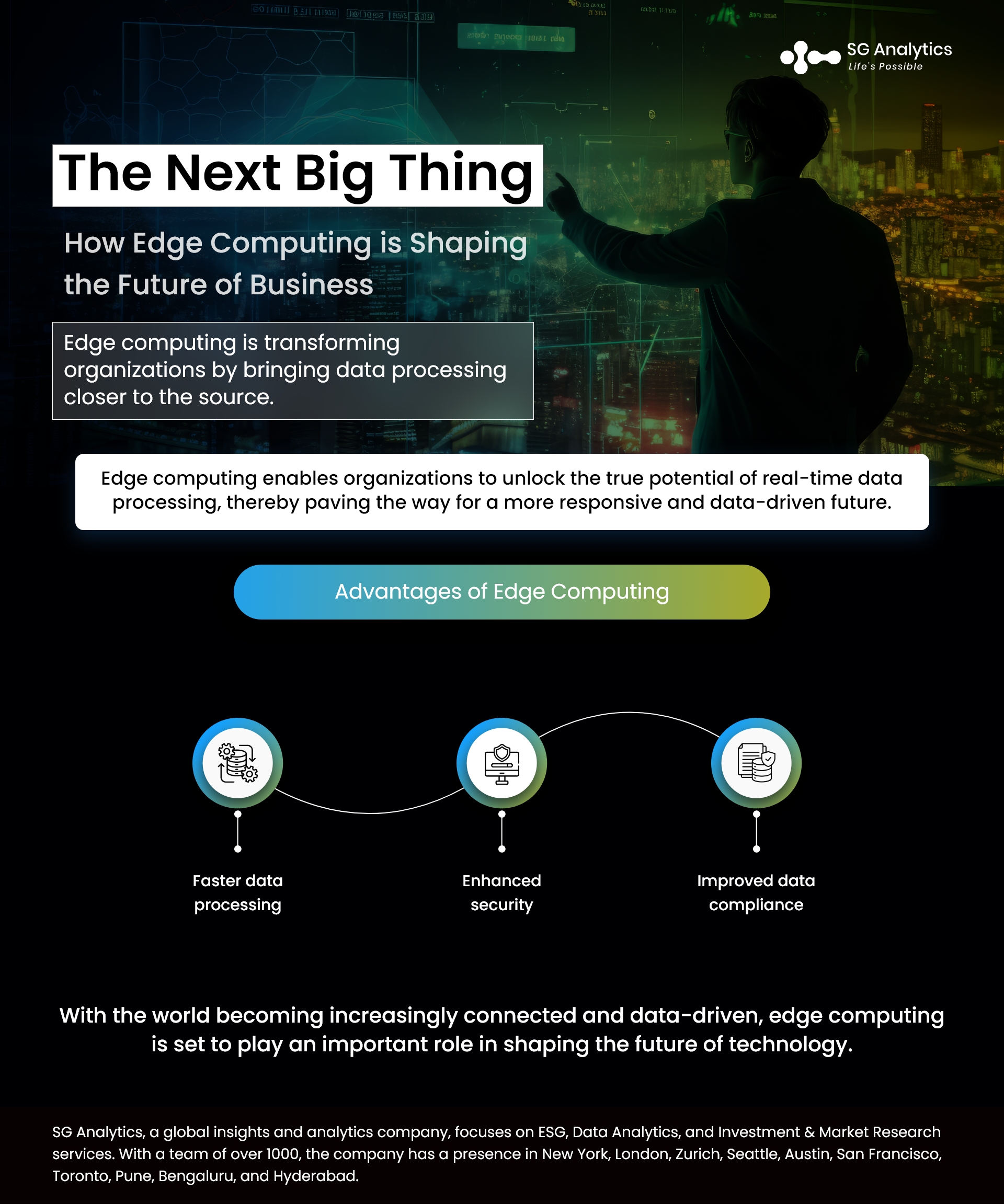In today's digital age, data generation is skyrocketing, and real-time decision-making is becoming crucial. Edge computing is emerging as a game-changing paradigm, bringing computation power and storage capabilities closer to the source of data generation.
By harnessing edge computing, organizations can enhance the speed and efficiency of their data processing while unlocking the potential of real-time insights and actionable intelligence. This will further help reduce the burden on network infrastructure.
Organizations can also leverage real-time insights and quicker decision-making for enhanced operational efficiency and user experiences. The reduced reliance on distant data centers can further translate to lower network congestion and decreased data transfer overhead. This will help optimize bandwidth usage and minimize associated costs.
Read more: How Data Analytics Consulting Firms Empower Businesses with Insights
The Rise of Edge Computing
Edge computing is gaining significant momentum due to the proliferation of IoT devices and autonomous systems. These technologies mandate real-time data processing, which traditional cloud computing models often struggle to deliver.
By processing data on local or edge servers instead of relying on distant data centers, will enable businesses to reap the benefits of rapid response times as well as reduced strain on bandwidth. This approach to data processing offers swift analysis and action, as computational tasks can be executed in close proximity to the point of data generation.
Edge computing fills this gap by supporting data processing. This approach further presents several advantages, including improved scalability and security.
By enabling faster data processing and reducing latency, this technology enables organizations to develop new applications and services that respond in real-time to user needs. It also opens new opportunities for enhanced security features. Edge computing significantly helps reduce latency, enhances reliability, and unlocks new opportunities for innovation.

How Does Edge Computing Work?
In today’s fast-paced digital world, businesses are seeking ways to improve efficiency, decrease latency, and enhance user experiences. One technology making waves in this domain is edge computing. This innovative approach assists organizations in processing data closer to the source, providing numerous benefits and transforming industries. Edge computing is further revolutionizing how data is handled and utilized.
Read more: Building an Effective Data Governance Strategy: An Ultimate Guide
Edge computing involves decentralizing data processing to bring it closer to the source of data generation. In edge computing processes, data is stored on local devices or edge servers. This proximity helps in reducing the time required to analyze and act on data.
The process begins with data generation through IoT devices. This data is processed locally by edge servers, including gateways and routers. By handling data at the edge, organizations can improve bandwidth efficiency and enhance overall operational performance. This approach further minimizes the need to transmit large volumes of data to distant data centers, thereby reducing their costs and increasing security.
Advantages of Edge Computing
Edge computing is undeniably transforming organizations by bringing data processing closer to the source. It possesses the ability to improve efficiency and enhance data security, making it a valuable asset for them. New and greater innovations and improvements in performance are set to change the future of edge computing, thus giving rise to endless possibilities for enhancing operations and driving progress.
- Faster Data Processing: Edge computing ensures faster processing and lower latency by reducing the distance data must travel. This is critical for various applications that require real-time responses, like augmented reality (AR) and virtual reality (VR).
- Enhanced Security: When data is processed locally, there is less risk of it being intercepted during transmission. This is important across industries like healthcare and finance, where sensitive data insights need to be protected.
- Improved Data Compliance: Edge computing allows organizations to comply with data sovereignty regulations, thus keeping the data within specific boundaries.
In essence, edge computing enables organizations to unlock the true potential of real-time data processing, thereby paving the way for a more responsive and data-driven future.
Read more: Data Quality Management: Key Challenges and Solutions for Data Consultants

Challenges and Opportunities
While edge computing presents numerous benefits, it also has its challenges. Edge computing devices have limited processing power and storage capacity, necessitating resource optimization. Data management is also emerging as a critical component, as there is a need to balance processing and storage with cloud-based operations.
Edge computing brings computation and data storage closer to the location where they are needed. This helps improve the response times and save bandwidth. The objective of edge computing is to drive the computation away from data centers and towards the edge of the network. This approach helps in reducing the volumes of data that must be moved and the distance the data must travel.
Ensuring data privacy and security at the edge is critical, as edge devices are susceptible to cyber threats. However, these challenges present opportunities for innovation, including developing edge AI algorithms and optimization techniques for resource-constrained environments.
Future Trends
The future of edge computing looks promising. With the rise in 5G networks, the bandwidth and connectivity constraints are significantly being alleviated. This enables businesses with real-time data processing on a larger scale, unlocking new possibilities for growth.
Furthermore, integrating edge computing with artificial intelligence (AI) helps improve local decision-making capabilities, enabling devices to process and act upon data. With edge computing continuing to evolve, organizations are likely to expect an increase in adoption across different domains, ranging from smart homes to retail, healthcare, and industrial automation.
Edge computing is also transforming the landscape of data processing, fostering real-time decision-making and enhancing system efficiency. With the world becoming increasingly connected and data-driven, edge computing is set to play an important role in shaping the future of technology.
Read more: Role of AI Consulting Services in Business Growth & Innovation

In Conclusion
Edge computing is an efficient brain for computers that organizations are integrating into their operations. It works fast and is super intelligent at handling data, which means it can enable them to perform tasks better and faster than before.
In a world inundated with data, processing this data is not just a logistical question but a strategic one. And edge computing can help transform the very nature of modern business operations. Edge computing is a big change that enables businesses to stay ahead in the race, performing efficient operations with their data. Businesses that adopt and leverage edge computing will set the stage for unprecedented growth, versatility, and responsiveness.
A leading enterprise in Data Analytics, SG Analytics focuses on leveraging data management solutions, predictive analytics, and data science to help businesses across industries discover new insights and craft tailored growth strategies. Contact us today to make critical data-driven decisions, prompting accelerated business expansion and breakthrough performance.
About SG Analytics
SG Analytics (SGA) is an industry-leading global data solutions firm providing data-centric research and contextual analytics services to its clients, including Fortune 500 companies, across BFSI, Technology, Media & Entertainment, and Healthcare sectors. Established in 2007, SG Analytics is a Great Place to Work® (GPTW) certified company with a team of over 1200 employees and a presence across the U.S.A., the UK, Switzerland, Poland, and India.
Apart from being recognized by reputed firms such as Gartner, Everest Group, and ISG, SGA has been featured in the elite Deloitte Technology Fast 50 India 2023 and APAC 2024 High Growth Companies by the Financial Times & Statista.









